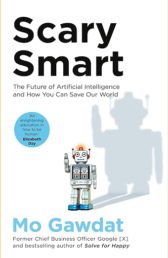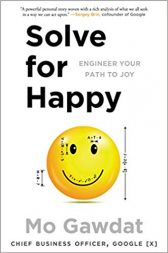Mo Gawdat is the former Chief Business Officer for Google [X]; international bestselling author of Solve for Happy, Scary Smart, and That Little Voice in Your Head; host of the globally popular podcast Slo Mo: A Podcast with Mo Gawdat; and founder of the One Billion Happy movement.
Mo has an impressive combined career of 27 years, starting at IBM Egypt as a Systems Engineer before moving to a sales role in the government sector. Venturing in to the UAE, Mo joined NCR Abu Dhabi to cover the non-finance sector. At Microsoft, he assumed various roles over a span of seven and a half years, eventually heading the Communications Sector across Emerging Markets worldwide.
Mo joined Google in 2007 to kick-start its business in Emerging Markets. He is fascinated by the role that technology plays in empowering people in emerging communities and has dedicated years of his career towards that passion. Over a period of 6 years, Mo started close to half of Google’s operations worldwide.
In 2013, Mo moved to Google’s infamous innovation arm, Google [X], as Chief Business Officer, where he led the business strategy, planning, sales, business development and partnerships.
Google [X] does not attempt to achieve incremental improvements in the way the world works, but instead, it tries to develop new technologies that will reinvent the way things are and deliver a radical, ten fold—10X—improvement. This leads to seemingly SciFi ideas such as: Project Loon, which aims to use high-altitude balloons to provide affordable internet access to the 5 billion people on every square inch of our planet; Project Makani, aiming to revolutionize wind energy generation using autonomous carbon fiber kites; as well as self-driving cars, Google Life Sciences, and many more. The business team under Mo’s leadership designed innovative business models analogous to the disruptive technologies [X] creates and created deep partnerships and global deals that enabled [X] to thrive and build products fit for the real world.
Alongside his career, Mo remained a serial entrepreneur who has cofounded more than 20 businesses in fields such as health and fitness, food and beverage, and real estate. He has served as a board member in several technology, health and fitness, and consumer goods companies as well as several government technology and innovation boards across the globe. He mentors tens of start-ups at any point in time. Through his 12 years of research on the topic of happiness, Mo and his son Ali created an algorithm and a repeatable, well-engineered model to reach a state of uninterrupted happiness, regardless of the circumstances of life. In 2014, this model was put to the ultimate test when Mo lost his son Ali to preventable medical error during a simple surgical procedure.
In his attempt to honor Ali and deal with his tragic loss, Mo wrote his international bestselling book, Solve for Happy: Engineer Your Path to Joy (2017). The book’s happiness equation and its dedication to Ali serve as the pillar for a Mo’s personal moonshot: a mission to deliver his happiness message to one billion people around the world (#onebillionhappy).
In 2020, Mo launched his successful podcast, Slo Mo: A Podcast with Mo Gawdat, in which he and some of his wises friends explore the profound questions and obstacles we all face in life. It is frequently the #1 Mental Health podcast in the UK and several other countries around the world.
In 2021, Mo published Scary Smart: The Future of Artificial Intelligence and How You Can Save Our World, a guide to navigating the future of ethics in light of the rise of machines and AI. It was named one of The Times and Sunday Times top business books of the year.
Questions? Contact Us Any Time:
805.965.1400
info@bigspeak.com
In 2022, Mo released That Little Voice in Your Head: Adjust the Code That Runs Your Brain (2022), a user manual for using the human brain optimally to thrive and prevent suffering.
His latest book is Unstressable, a practical guide to stress-free living that shows how chronic stress is not an unavoidable part of modern life, but rather a predictable and preventable pandemic.



